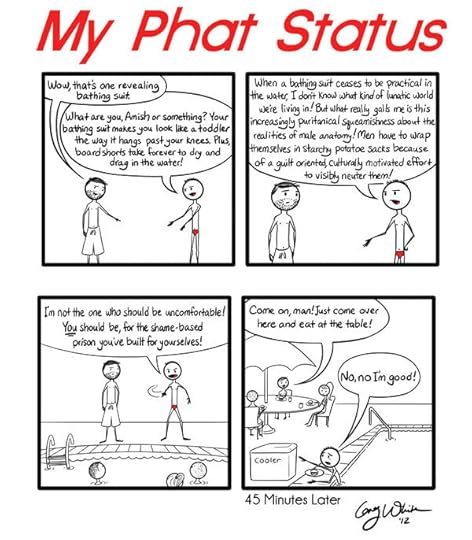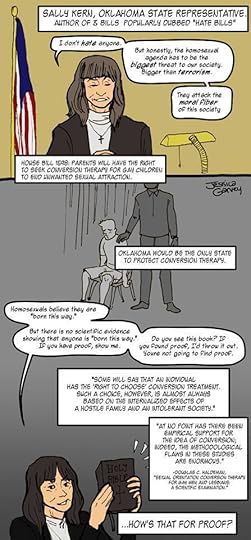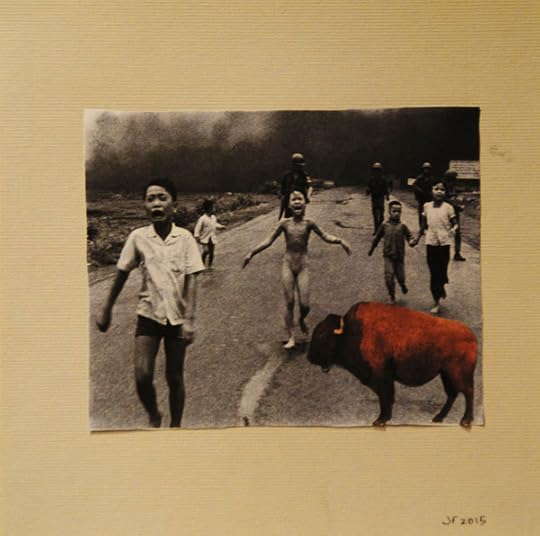Charles Martin's Blog, page 19
March 6, 2015
Let’s be honest. We ignore Congo’s atrocities because it’s in Africa: Repost from The Guardian
By Owen Jones
Some lives matter more than others: the “hierarchy of death”, they call it. The millions killed, maimed and traumatised in the Democratic Republic of Congo are surely at the bottom of this macabre pile. The country was the site of the deadliest war since the fall of Adolf Hitler, and yet I doubt most people in the west are even aware of it. No heart-wrenching exclusives at the top of news bulletins; no mounting calls for western militaries to “do something”.
We are rightly appalled at a barbaric conflict in Syria that has stolen the lives of 200,000 civilians; and yet up to 6 million people are believed to have perished in the DRC. Not that the mainstream media alone can be berated for this astonishing lack of attention. The left have rightly championed the cause of a Palestinian people subjected to decades-long occupation and subjugation: surely the misery of the DRC does not deserve this neglect.
Although the murderous intensity of the war peaked between 1998 and 2003, the misery has persisted. According to Oxfam, civilians in the east of the country still face exploitation at the hands of armed groups. The UN has labelled the country“the rape capital of the world”. Women, girls and boys have been systematically raped as a weapon of war. Back in 2011, it was estimated that 48 women were raped every hour in the country. Men were raped, too: there are stories of men being raped three times a day for three years. Then there’s the cannibalism: at one point, pygmies in the north east were being killed and eaten by rebels.
It was a war that was remorseless when it came to the innocent: when 45,000 people were being killed every month, around half of them were small children, even though they only represented a fifth of the population. The war triggered devastating waves of starvation and disease which claimed the lives of millions
My Phat Status: Revealing Bathing Suit
Our Modern Gods
Marvel March Action Auction to support Cleveland Elementary Arts Program
6-10 pm Friday, March 6 (Preview)
7-9 pm Thursday, March 26 (Final Bids)
Bombs Away Art
3003A Paseo in Oklahoma City
Religion is not declining. Don’t believe the numbers assembled by Pew Research, we are as devoted to our faiths and our mythologies as we’ve always been. The icons we celebrate may be shifting away from those our parents knelt before, but we are a worshipful people. It is in our nature. We need heroes and villains to inspire us, to frighten us, to act as metaphors, to give us guidance on how we should live our lives.
Jesus. Rama. Buddha. Mohammad. Captain America. It’s all the same. Perhaps the modern phase of superhero tales don’t promise the hope of eternal grace/damnation, but their purpose is the same. They give us an ideal to strive toward and to allow us to pretend that there is a higher power protecting us. These are the forces that dispense justice to the wicked. These are the forces that swing in to deliver us from evil with great feats and mystical powers. We may not pray to them, we may not harbor faith that they are real, but they can be just as important to our intellectual and emotional development as the stories contained in the Bible, the Koran, or the Torah.
But unlike other major religions, Spiderman is not competing for sole possession of our hearts as are many of his mythical brethren. One of his Avengers teammates is the Norse god, Thor. In fact, Marvel’s Infinity Gauntlet gave shout-outs to Odin, Manitou, Svarog, Tezcatlipoca, Zeus, Itzamna, Osiris, and Nuada as part of a super-duper hero team pulled from some of the world’s most powerful deities. Perhaps some of our global religious tension might be eased with a well-crafted crossover comic series. Prejudice can’t survive proximity.
So, modern fan art is not so different from the lush iconography gracing places of worship across the globe. The sculptures and paintings allow us to revel in the superhero ideals as the stories speak to a desire for justice, the potential for heroism, the opportunity to create a better world, and to find hope in the bleakest of moments. Celebrate these heroes with us and purchase some art for a good cause. Daredevil is gonna look great next to that crucifix. Galactus will be an interesting pairing with your Tibetan Wheel of Life. And did I mention that Captain America is a devout protestant?
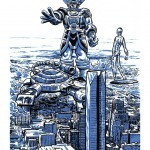

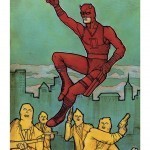
March 5, 2015
Conversion Therapy w/ Sally Kern
March 2, 2015
Napalm Girl w/ Bison
February 27, 2015
Clint Stone’s PROMISE OF A BRAND NEW DAY OR WHATNOT: Vol. 1 Release Party!
Exclusive trading cards out now to promote the release party of Clint Stone’s PROMISE OF A BRAND NEW DAY OR WHATNOT! Find Clint Stone in the flesh and bones or visit Bombs Away Art at 3003A Paseo to collect them all*! Then come back to Bombs Away Art at 3003A Paseo on March 20 from 6:30-8:30 to also collect Stone’s first volume of whimsical thoughts and pop art illustrations! You simply cannot find a better use of you $4. You can’t**!
*Limit One.
**Maybe you can. I’m sorry for shouting.
CHOOSE YOUR OWN ADVENTURE WITH THE JERRY BENNETT CH. 5 – The End
For a life-long pacifist, Jerry had been in plenty of fights. He remembered each one vividly, the exhilaration of an adrenaline-fueled punch, the awkward madness of combat, the sickening anger that made him shake for hours afterwards whether he’d won or lost. He despised fighting, the way it made him feel about himself and the way it made him fear the world.
The guardsman was young. His soft cheeks were red from the cold. He wasn’t struggling anymore, but hanging limp, exhausted resignation in his eyes. Jerry feared the air was too thin for him at such a high altitude. The young man reminded Jerry of so many others he’d met at comic book conventions, the eager fans hanging onto a slice of their childhood to insulate them from the cruelty of adulthood. Comics may be silly to some, but for the fans, it was something to believe in.
Even in all the gear, Jerry could see the man was short and thick-framed. Probably a Wolverine fan.
Jerry’s jet frame collapsed and folded, replaced by his robot form. Jet’s burned out of his feet, keeping Jerry aloft. He dipped, began listing again.
“Auto Pilot? YES/NO?” appeared in his mind.
“Oh, yes, thank God!” Jerry gasped as he felt his body correct, raising back up to face Tabitha.
He brought up the weapons list, glancing over the options. He thought of Robert Downey Jr. in the desert talking to military officers: “…the best weapon is one you never have to fire…” Intimidation.
Movement along his spine, more parts twisting and connecting. He reached over his shoulder, gripping metal that reached up to his fingertips. He pulled out a still forming broadsword that stretched longer than his own torso. When the last panels of metal folded into place, the broadsword glowed with sparking blue electricity.
“Wow,” Jerry gasped. He looked up at Tabitha, who was also stunned. Even the weakened guardsman found the strength to tilt his head up to watch. Jerry rose the sword above his head with one arm, thinking of Thundercats/He-Man. The sword sparked like a Tesla coil.
“Give him to me now!” Jerry growled, reaching out his other hand toward Tabitha.
She looked from the sword to Jerry.
“Take him.”
Tabitha dropped the guardsman. A red box fixed on the falling human. Jerry dove down, his jets engaging. The box grew as Jerry quickly approached. He reached and gripped the guardsman, swung the sword over his head and fixed it onto his back. He transformed into the jet, tucking the human into the cockpit as he changed, then sped back down to the base. Behind him, Tabitha was pursuing, but had not fired.
Jerry slowed as he reached the base, transformed and achieved a stumbling landing on the inside of the fence line. He gently lowered the guardsman to the ground, reached back for his sword, wielding it in front of him as he faced Tabitha while she landed just on the outside of the fence. The electricity from the sword leapt out and sparkled along the metal fence. Tabitha measured Jerry while Wrecking Ball and Inferno/Bandit joined at her side.
“You can’t stop us, Jerry,” Tabitha said. “Not all three of us. If we want to get on this base, we will get on this base. You stand in our way, we will kill every human inside too, just to make a point. And we aren’t the worst Jerry. The others out there won’t stop with the humans you protect, they will find your family and…”
“Shut up!” Jerry screamed, lunging forward, piercing the fence and slicing it in half. The steel fencing glowed red and melted. The posts split in half as if made of soft butter.
The three robots scrambled out of the way as electricity shot through their bodies. Their arms and faces twitched from the currents racing through their systems.
“Leave us alone!” Jerry growled. “We are done fighting. You will not threaten me again! You will not step one foot closer to these people or I will tear all three of you down.”
Jerry kicked the broken fence down and stepped through the gap.
“This world does not belong to us!” Jerry continued, the three robots backing away as he approached. “Whatever happened to us is a gift and I intend on using it to protect our people. All of humanity. You threaten any one of them, then you are threatening me too. Do you understand?”
Tabitha’s eyes were lowered away from Jerry.
“Do you understand?” Jerry shouted.
“Yes,” Tabitha said, the other two cowering behind her.
Jerry took a few moments to let his heart slow. He watched the three. They were lost, but they weren’t evil. He pitied them.
“There is a better way,” Jerry said, his voice softening. “If there is worse out there, then we can fight it together. We won’t fight over the humans, but for the humans. We can be heroes.”
Tabitha let out a weary laugh. “Yeah, whatever David Bowie.”
She looked to the others, then straightened. She walked to Jerry.
“I admire your conviction, brother,” Tabitha said. “The humans are lucky to have you, but you are wrong. This is not over.”
She turned. Her body twisted and transformed into a 1955 Cadillac DeVille. The other two followed suit, Wrecking Ball as a Scorpion Peacekeeper tank and Inferno/Bandit as a roaring 1973 Camaro. Jerry watched them speed away.
A terrible anxiety churned inside his mind. He had to get back to his wife. If there was worse out there, Jerry thought, then they could be destroying Oklahoma City.
“Victorious warriors win first and then go to war, while defeated warriors go to war first and then seek to win.”
Jerry turned toward the voice. The black-suited man stood behind him.
“It’s Sun Tzu,” the black-suited man said. “Read him for Officer Candidate School. Whatever happened to you, it wasn’t magic or God, it was an attack. You know that right?”
“Yes,” Jerry said, thinking of the visions.
“Something bigger is coming,” the black-suited man said. “Whoever changed our people into war machines knew that it would throw our world into chaos. They let us fight each other until we are exhausted, then they swoop in when we are too weak to defend ourselves. A brilliant strategy.”
Jerry was still thinking of his wife, remembering their safety plans for fire, tornadoes, thieves. She was probably in the hall closet, buried under the coats, knitting him another scarf.
“I’ve got to get home,” Jerry said. “I’ve got to get to my wife. I will still help however I can, but she comes first.”
The black-suited man looked back to a major standing just inside the fence line. The major nodded.
“Okay,” the black-suited man said, facing Jerry. “I am going to come calling and when I do, I need you to answer.”
“Yes, sir.”
The black-suited man smiled, turned, and walked back into the base. Jerry leapt into the air, transformed into a jet and blasted into the sky. For a moment, as he climbed into the atmosphere, he gazed beyond the blue, looking for what lay beyond.
Another flash of images. A robotic dinosaur. A red and blue semi-trailer truck. A low, rumbling, predatory laugh. Something bigger was coming and Jerry wouldn’t be able to face it alone. He was going to have to find help.
THE END
*If you are interested in participating in a Choose Your Own Adventure Commission, email charles@literatipressok.com for pricing and more information.
February 26, 2015
Ungay Me, Lord, or The Bible as Bludgeon.
Sally Kern has managed to land Oklahoma in national news once again for all the wrong reasons. Her legislation to protect practitioners of “conversion therapy” is meant to allow pastors, parents, and “ministries” like Oklahoma City-based First Stone to ungay teenagers. If adult persons decide they cannot endure their sexual selves and seek out conversion therapy, that is within their rights, however wrong-headed it may be. But to force teenagers to convert from gay to straight makes this a different sort of issue, one that opponents to conversion are calling “child abuse.”
The virtual and real-world conversations that have emerged remind me of one of my favorite scenes in a very under-appreciated movie, 2004’s Saved! The Jena Malone/Mandy Moore vehicle was writer-director Brian Dannelly’s jab at private Christian schools and “degayification” ministries. For people raised around fundamentalists and evangelicals, the characters in Saved! might have been drawn slightly larger than likely, but the spirit and dialogue ring very true.
At a crucial point in the movie, Mary (intentionally named, I’m sure) played by Malone has discovered that her uber-perfect Christian boyfriend Dean is likely gay. It is Dean, played by Chad Faust, who will be sent off to degayification therapy. Mary is approached by an overzealous girl who has long-resented the perfect Christian couple.
“Hey, Mary, sorry to hear about Dean’s faggotry,” Tia says without a hint of sympathy.
The scene highlights the social depths to which homosexuality has traditionally pushed Christians who happen to be gay and in communities where homosexuality is considered an affliction to be endured at best. The less charitable communities call it a choice or an abomination or some other Bible word they’ve been taught to use sans context.
As I am watching the conversation controversy unfold, I’m once again mystified that people on both sides do not know how to talk to each other. Full disclosure: I am opposed to conversion therapy, and I think Sally Kern is trying to solidify her legacy as a legislator by writing or championing fundamentalist-inspired legislation that she will use later to dress up her resume as a speaker and writer. She is in her final term due to Oklahoma’s term limit rule. Most of the legislation did not even make it out of committee, but it will preach well when she is addressing a room full of fundamentalists.
People who did not grow up in these communities or who have not bothered to try to understand what words mean in different contexts cannot begin to fathom why any Christians would support conversion therapy. Conversion therapy is based on a couple false assumptions:
1. Gayness is a sinful choice or an unfortunate affliction, but either way it must be resisted;
2. Our true identity is “hid with Christ in God,” which is to say we have all sorts of imperfections, but we need to understand who we are “in Christ” to truly know who we are. This entails being reminded that we are lovely, straight, whole, and made for holiness. That is the heart of conversion therapy.
Most evangelicals and fundamentalists believe some version of these assumptions, and many of them even hold non-toxic versions of these beliefs. Who, after all, doesn’t want to believe that a relationship with God can heal their hurts, or that God sees who they are deep down, or that religious friendship and Bible reading can give us strength to overcome the weaknesses with which we all are beset? The difference, of course, is what to do with human sexuality.
Unfortunately, the worst practitioners of conversion therapy will insist that childhood traumas–molestation, abuse, rape, abandonment–create aberrant sexuality. While this can certainly be true to an extent, they wrongly assume homosexuality is not a naturally occurring variation in human sexuality but a perversion of God’s intended design. At this point, young people are regularly subjected to counseling by unqualified persons who believe the Bible holds the key to mental health. Many are deeply distrustful of psychology and medicine, and while I can agree that we all ought occasionally to be distrustful of those things, a perfunctory reading of the Bible is enough to convince an honest reader that it has damn little to say about mental health–that being a category with which ancient people were largely unfamiliar.
The least toxic practitioners will tell people that God may not change their desires, but will give them strength to persevere as celibates. This is one of the more unintentionally perverse ideas in so-called Biblical counseling.
Please note that you are not gay but you will continue to have same-sex desires.
“So, God will change me?”
No. You’ll need to be celibate, but God and your church will be here for you.
“So I’ll remain gay?”
You’re not gay. You are a child of God who is healed and whole, but you have to grow into that reality.
“So when I do, I’ll be straight?”
Not necessarily. You may have these desires the rest of your life.
Why not just call it what it is? The person is gay. That admission would undermine the entire rubric by which these people read the Bible, though. How, after all, do you acknowledge that God got something so obviously wrong? (Never mind that they have moved on with the whole slavery thing…) They would be forced to admit that whoever wrote the text got it wrong, not God, which would lead to a brand new hermeneutic (the ways people interpret the Bible and other sacred texts), and one that does not support their deeply-held convictions.
The battles over the Bible and culture are not just about the issues over which the Sally Kerns of the world write legislation and make idiotic pronouncements. At a very fundamental level, the battles are about what to do with a very old book and what authority its believers have to describe how the world does and ought to function. All of us are guilty of wanting the world to be as we prefer it, and our assumptions and convictions about what it ought to look like must be defended with more than just a “Thus sayeth the Lord,” especially when the lord of this particular book is so clearly wrong.
CHOOSE YOUR OWN ADVENTURE WITH THE JERRY BENNETT CH. 4
Life does not provide many moments of absolute clarity. Perhaps a handful, even for those who possess the most resolute of convictions. For Jerry, this was only the fifth such moment where the path forward glowed with an almost divine certainty. The other four moments included:
1. Proposing to his future wife,
2. Quitting his job to pursue art,
3. Finally understanding the concept of faith,
4. At four-years-old, choosing the Pink Panther bar during his first visit to an ice cream truck.
Jerry did not think of death as he walked to the open cargo doors. He did not think of pain. He only thought of the pride of a life that had led to a singular action. He may be defeated in whatever lay ahead, he may not be powerful enough to protect the humans around him, but he was walking forward toward the danger and that felt significant enough. He was doing the thing that would make him proud should he live to remember this day.
His joints began disengaging, his frame collapsing and folding. A roar erupted from a turbine jet that formed from what was once his feet. With a powerful blast, Jerry shot into the sky. His heart beat madly while his sleek jet form soared upwards. Shaped like an F-35B fighter jet, Jerry split the clouds, watching the water vapor collect on his windows, sensing the atmosphere change as his altimeter clicked past 6,000 feet and quickly approaching 7,000. Jerry laughed, dazzled by the view of the distant Earth below.
“Oh, right! I’m supposed to be down there!”
Jerry pulled out of his climb. Flying in a straight line was easy, but turning was a bit trickier. He sensed the air pockets passing along his wings, he rode them, correcting, dipping below the horizon and angling back down into a nose dive. An explosion blossomed below. A red square framed the fireball, zoomed in. Guardsmen were scattering away from the flames gushing out of a cargo truck. Smaller green squares singled out the humans. Jerry’s jet burned angry. The speed formed a white halo that passed from the nose to the tail. A thunder clap boomed as Jerry passed the sound barrier. The earth approached at a frighting rate. Three red squares appeared on objects outside the base’s fence line. Tracers from .50 caliber guns zipped past the moving objects. Gun flashes showed returning fire.
Jerry’s form bent, the jet pointing down, his drop slowing. Jerry’s vision enlarged the three invaders. One was an emerald green robot. Tall, lean, a woman. Another was a squat hulking dark green robot with massive cannons for arms. The third was coal black with a red phoenix painted on what was clearly the hood of a Camaro that now served as a chest plate. All three robots lowered their weapons and looked back up at Jerry as he awkwardly slowed to a hover above them.
Jerry wanted to drop in-between the base and the invaders like an angel enforcing a truce.
Instead Jerry listed to the left. He corrected, listed to the right, then started tipping down to the ground.
“Damnit, damnit, damnit!” Jerry screamed in a panic, shooting back into the air, splitting between the three robots and colliding with an oak tree behind them. His engine groaned as it strained to keep him aloft.
“Oh! I’m so sorry!” Jerry called.
The ancient tree collapsed to the ground. Jerry spun in a circle, steadied, listed to the left again. The fighting had stopped entirely as everyone watched Jerry spin in hobbled doughnuts around the three robots. Jerry transformed to a robot and fell to the ground. He stood, lost his balance, and back-pedaled into the barrel-chested green robot who pushed him back to the ground.
“Okay. Okay. Okay. Okay.” Jerry held his head, numbers and sensors and warning lights flashing bright in his mind. “Okay. Okay. I want to throw up. It’s okay. Um. Hold on.”
Jerry sat down on the ground, then laid back on his back. He looked up at the sky, waiting for everything to stop spinning.
“Oh my god. Okay. Um. I’m gonna need you guys to stop fighting.”
The three robots circled Jerry, looking down at him, then at each other.
“Brother, we came to liberate you,” the emerald green robot spoke, her voice deep, articulate, a hint of sultry smoke.
Jerry still couldn’t sit up.
“I appreciate that, but I really don’t want anyone getting hurt on my account. Hold on.”
Jerry pushed himself up to a sitting position, gave himself a moment, then stood up on his feet. He felt better.
“My name’s Jerry, by the way?”
“Charmed. I’m Tabitha. The short guy is—what did you want me to call you?”
“Wrecking Ball.”
“Right, whatever,” she said. “He’s Wrecking Ball.”
“I want to be Inferno,” the coal black robot cut in with a rich Manchester accent.
“No, we you are Bandit!” Tabitha groaned. “I’m not going to call you something different every five minutes.”
“I like Inferno.”
“Yeah, Inferno is better,” Wrecking Ball offered.
“I kind of like Bandit,” Jerry said. “I love Burt Reynolds.”
“I do too,” Inferno/The Bandit said. “I’m just worried people won’t get it. Like younger people who didn’t ever watch Smokey and the Bandit.”
“I bet more kids have seen it then you think,” Jerry said.
“Yeah, my little brother loves all those movies,” Wrecking Ball said. “He’s only seven.”
“Ha!” Jerry said. “That’s awesome!”
“Shut the hell up!” Tabitha closed her robot eyes, bringing her hand to her temple to ease whatever passed for a migraine in robots. Jerry wondered if she had a brain inside the machine. He then wondered if he had a brain. He then thought of the Wizard of Oz.
“This isn’t funny, Jerry,” Tabitha growled.
“Oh, I was actually thinking of something else,” Jerry said, the Youtube video of “If I Only Had Brain” still playing in his ears. “So, Tabitha, Wrecking Ball and Inferno. It is good to meet you and I appreciate the offer, I really do, but I’m good. Let’s just relax and figure this out together before anyone else get’s hurt.”
Tabitha was measuring Jerry. She then looked past him to the base with hundreds of guardsmen with rifles trained on them.
“You think you are still human, don’t you?” she asked. She was amused and her condescension angered Jerry.
“That’s what this is all about,” she continued. “You want to be their pal, their trained hero. They tell you to heel, and you’re gonna heel. You are fine just being a pet, a novelty, maybe even some high tech cannon fodder.”
“They are still our people,” Jerry said. “I don’t know what’s happened to us, but we are still human.”
“We were chosen,” Wrecking Ball said.
“By who?” Jerry asked.
“Who cares?” Tabitha asked. “It doesn’t matter. All that does matter is we are now better than all of them.”
Her feet flashed as jets pushed her off the ground. She flew above the fenceline and landed inside the base. She plucked a guardsmen off the ground and flicked the rifle from his hands. She held him up by the feet like a flapping chicken.
“Look at him!” she called. “This is no longer their world! It is ours! We need them just as much as we need a dog. And, just like a dog, if they snap at us, we’re gonna put them down.”
Tabitha’s jets blasted her off the ground again. She transformed into a jet with forward-swept wings and blasted into the air. Jerry leapt off the ground, transformed back into a jet, and flew after her.
She soared straight into the skies, reaching two thousand feet, then transformed back into a robot. The jets in her feet kept her steady as she waited for Jerry.
He slowed and hovered a hundred feet from her as she dangled the guardsmen.
“We’re the first ones you’ve met, aren’t we!” she called over her blasting jets. “You don’t know who else is out there. You need to join us, Jerry. I don’t want to kill humans, I just want them to behave. Some of our kind aren’t quite so empathetic. Alliances are forming and you need to make sure you are on the right side. I dislike ultimatums, but that is what I am giving you. Join us or fight us.”
“Give him to me and leave!”
Her grip on the guardsman’s legs tightened and he screamed. Tabitha smiled.
“Come and get him.”
WHAT WEAPON DO YOU USE?
Rocket launcher Chain gun Sword Flamethrower
PREVIOUS / NEXT
*If you are interested in participating in a Choose Your Own Adventure Commission, email charles@literatipressok.com for pricing and more information.
February 25, 2015
Why pretending we understand veterans is irresistible, a review of Phil Klay’s Redeployment.
A moderator at a panel discussion once introduced Jim Lehrer as a combat veteran from Vietnam. Lehrer, a former anchor of The News Hour, was tempted to let the mistake slide, enjoying the thrill of being associated with battle-hardened warriors, but ultimately corrected the moderator. Lehrer was a Marine during the Vietnam war, but never served in-country. Another respected and charismatic news anchor, Brian Williams, recently lied about his own experience as an embedded journalist, saying his helicopter received enemy fire during a flight through Iraq. Bill O’Reilly is also facing questions about his wartime reporting during the Falklands War.
It is easy to understand why journalists and storytellers are tempted to tether their own histories to the mysterious and powerful aura of war. There are few resume-builders as striking as time spent in the midst of the most powerful military institution in the history of mankind, especially when engaged in combat. It is why journalists embed, it is why so many of our finest storytellers opted to serve their country in foreign wars, and it is a big reason why I enlisted.
Yet, I am not a veteran. I exist in a weird in-between realm of military experience. Not fully just-a-civilian, but definitely not a Marine. I joined the Corps in the wake of 9/11, served a few quality months in Boot Camp, but was sent home after a medical condition arose. Neither an honorable or dishonorable discharge. Just the military version of a “Thanks, but no thanks.” The USMC decided that the expense of fixing me outweighed my value as a 0352 Infantry Tow Gunner.
When I arrived to the Routing Platoon, preparing to be shipped home, I was shocked at how easily I’d been discarded. I shared a converted storage space with a dozen or so other dazed recruits, watched planes take off and land at the San Diego International Airport next door, and waited on officers I would never meet to decide what the Corps would ultimately do with me. Some of the rejects in the Routing Platoon went back to training, but most of us were sent home.
I had no idea what to think about my fate. I spent most of my time writing, just recording all the pertinent moments of my abbreviated military career. Other rejects read magazines, argued politics, traded stories. A few rejects were on a near permanent bed rest including a man who was almost beaten to death by other recruits during an Intense Training drill that got out of hand. Another man boasted a cane and a permanent limp. Another refused to tell us what medical condition made him unfit for service, but instead only talked of returning to Alaska to go bow-hunting.
For those whose bodies failed them, it was an easier time since an odd air of respect was afforded us by the drill instructors. For those whose convictions failed them, the routing platoon was a tough existence. Left to ponder their failure, waiting to explain to their parents what went wrong, they were berated by almost everyone they came across. One young man cried when his father told him over the phone that he ripped the USMC bumper sticker off his truck. The poor kid had refused to train after a drill instructor punched him in the chest. Even we, his fellow rejects, couldn’t respect him. There was a sweet-hearted weirdo who, last I heard, was volunteering at a wolf preserve in California. He’d tried to jump off the third floor of the barracks after a DI called his bluff on his “suicidal intentions.”
There was also a salty Texan with low bone density, at least three who popped for marijuana on piss tests, a noble intellectual with a debilitating case of hemorrhoids, and a guy who refused to train after he finished the Gauntlet. It was the last major hurdle on the way to becoming a Marine. None of us could understand why he quite after coming so close and he didn’t like to be asked.
This was my military experience. Short and insignificant in comparison to an actual Marine, but still a very informative period of my life and I rarely miss a chance to swap stories with actual veterans, as if making it two months through boot camp made us the same.
So, reading Phil Klay’s brilliant series of short stories entitled Redeployment, I was struck by how the weird unreality of my boot camp memories actually permeates the rest of the Marine experience. Klay’s stories cover wartime, transitioning to civilian life, and, of course, redeployment. Klay captured these times from an array of viewpoints, all containing the big emotions and small details that strip strip away the mystery and glamour of war. His voice is warm and familiar with a deep affection for his characters, even as he lays out their scars and truths with a startling honesty. The experiences all read as unnatural, something humans aren’t meant to be doing. Like in the machinery of our minds, these moments are parts that simply will never fit with the rest of the gears and servos.
Then we, the civilians, thank the veterans for their service and beg for stories that they don’t want to tell. These stories are so foreign to our own that veterans might as well be speaking another language. Klay’s characters portion out their war stories to the uninitiated to angle for sex, sympathy, free drinks, all banking on the money shot: the mystique of suffering. That is the signature of the modern war story, what the author delves into, what draws young men and women to the battlefield and the rest of us to their stories.
My best friend is a combat vet. My father is a combat vet. I am always eager for their stories, partly out of voyeurism, partly because I like the feeling of being trusted by a veteran in a way they don’t trust others. It makes me feel like I somehow understand and am more engaged in the war experience. I am not, of course, and it is deeply embarrassing to admit that I am just another boot camp wash out. Redeplyment did an excellent job of calling me out on my bullshit.
The hard question is how do we help these veterans re-engage with civilian life? Redeployment doesn’t provide a firm answer because what they need changes from person to person and from moment to moment. Klay’s characters don’t want to be thanked for their service, nor do they want to be ignored. In Klay’s portrayal, the struggle does not end when the troops return home, but rather fades slowly. By attaching ourselves to the mystique of combat to embellish our own lives, we diminish the struggle of those who carry the real weight of war.

